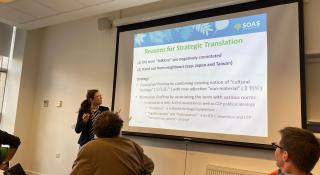
Breadcrumbs navigation
Equally precarious? Precarity, excellence, and the prospect of an academic career for a ‘non-traditional’ scholar
In the second blog of our special series, Dr Sanja Djerasimovic explains the causes and consequences of the economic and personal 'precarity on the road to permanence' in academia. Continuing the work flowing from our 2021 BISA and PSA report 'Career trajectories in UK departments of Politics and International Relations', Dr Skyler Hawkins (Newcastle University) coordinated this series to give real faces and experiences to the key statistical findings.
I remember when, over a decade ago, well into the first year of my doctoral degree at a prestigious university, I heard the word ‘postdoc’ for the first time in my life. It was uttered by a fellow PhD student in the context of trying to recruit me for the co-authorship of a paper, to ‘help our chances of getting a postdoc’ after we graduated. This innocuous episode, that might be as common to the world of doctoral study as a mental health crisis, was both deeply confusing and troubling to me at the time. It revealed a world of (in)opportunity and academic legitimacy that seemed rather paradoxical. In this world, a PhD student – at the time, I was not privy to the more empowering option of ‘PGR’ or even ‘doctoral researcher’ – could already be considered to possess enough academic authority to generate knowledge that others, including her professors, and even those whose very work she reads and cites on a daily basis, will take seriously, yet for whom the subsequent achievement of earning a doctorate, presumably amplifying this authority manifold, would not be enough to qualify her for an academic job. It would merely be the first step in the long process of striving, and one with an uncertain outcome.
This may seem awfully naive, and one may think that anyone hoping to enter the world of academia with that level of ignorance about how it actually works beyond the basic minimum of mastering research skills and becoming an expert on a topic, has only herself to blame when, few years later, she finds herself at a receiving end of a string of rejection emails, another of her zero-hour contracts coming to an end, minimum-wage employment options seriously considered as the only means of survival. Despite, at that point, a publication in a ‘good’ journal, despite papers presented at all the relevant international conferences, and the teaching experience, the odds were simply not in her favour. As they will not be for many, many bright, hard-working, well-deserving doctoral graduates. And this will not merely be the effect of the oversupply of doctorates in the context of the neoliberal university’s overreliance on a casualised workforce, in which only the ‘objectively’ most capable will succeed in attaining an academic post. Because the figures that signify citations, h-indexes, and funding already secured – those, you guessed it, objective measures of capability and meritocracy in the cut-throat academic job market – are often belied by further factors overlooked in the unlikely passage from the post-doctoral precariat to salariat: the hidden curriculum of doctoral study and the necessary cultural and social capital, and the fact that a prolonged period of precarity for some is simply not an option that they can afford, financially and otherwise.
In a recent project on PGRs’ wellbeing and social identities, one of my female interviewees remarked: ‘I’m going to be 28 this year, and at some point I want to have children, I want to have a family. If I stay in academia knowing that [achieving an academic post will] probably [take] about ten years, if I am lucky enough to get contracts even. Constantly moving, considering my partner as well in everything, where we could potentially settle down. So this is very, very anxious times for me.’ Another wildly competent and experienced doctoral researcher interviewed for a different project commented in response to her supervisor’s suggestion that there would ‘always be bits of work’ for her to look forward to as she was nearing the end of her doctorate: ‘And I am wondering for how long and when that bit ends, does another one come along, and at what point do you get 100% of bits and at what point do you get enough to pay your rent and get a mortgage?’ Faced with up to a decade of finding ‘bits’, and a sector obsessed with ‘excellence’ measured in outcomes whose achievement still assumes complete devotion to research, competitiveness, and productivity while such minor nuisances as regular income and looking after dependants are taken care of, many female doctoral graduates will decide, or rather be forced, to give up on the pursuit of an academic career altogether.
Among those will be many lacking not only the financial means and the flexibility to move (often geographically) from one fixed-term post to the next, but lacking also the self-assurance and skill of navigating the historically elitist and hermetic institution of academia. For some, as emphatically expressed by another of my PGR interviewees, someone obviously in possession of enough academic competence and potential to be awarded funding for her PhD at a Russell Group university, doctoral experience often feels like ‘[being] given a plane engine and I need to work out, without any help, how to put the bloody thing together. … [I feel like] a script, a formula that maybe some people have, I’m not getting it…’ This is far from an isolated occurrence in the imposter-syndrome plagued academia, that, despite its recent (and in some ways problematic) EDI efforts, continues to expect all new entrants to be practiced and confident academic profile- and network-builders, or at the very least absorb the necessary lessons by simply observing the cultural and gendered ideal of a golden-ticket-earning performance. Any efforts at tackling the issue of access to/success in the academic profession have to recognise that for some, the precarity on the road to permanence – and from there to seniority – is not ‘only’ economic; it is also the precarity of determination and self-belief that is battered and questioned with each innocuous episode that reminds them that perhaps they do not really belong there.


